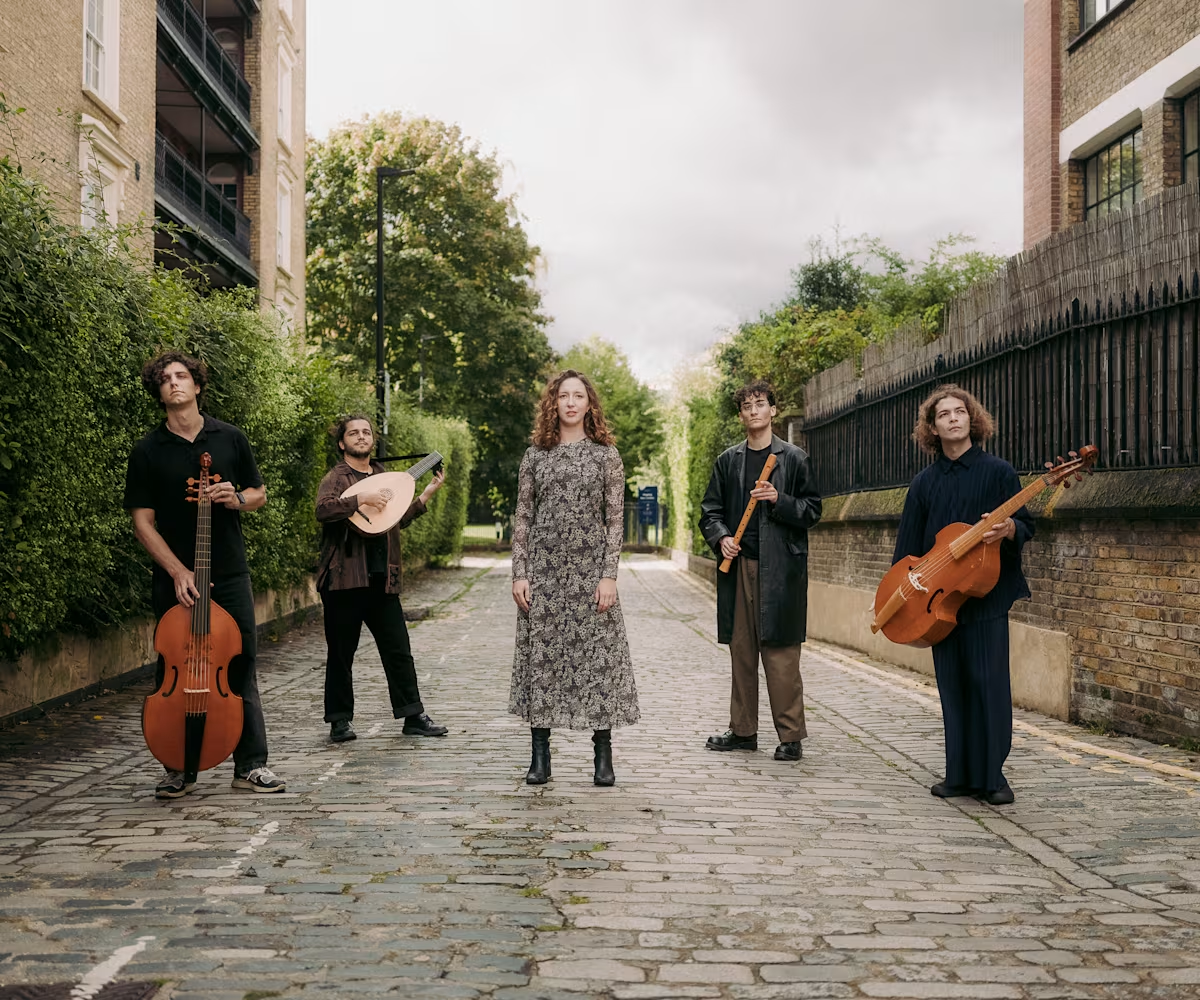Londinium Consort
Crossing Paths
A musical journey from the English renaissance to contemporary composers

The opening of our set has been inspired by Will yow Walke the Woods soe Wylde, a Tudor song that is quoted by John Dowland in his enduringly popular Can she excuse my wrongs. Using an initial phasing motif, we aim to capture the frantic sounds of the city, arriving eventually at the solitude of nature, where exile becomes a refuge. Can she excuse my wrongs was first published in 1597. With text attributed to Robert Devereux, the second Earl of Essex, we hear a personal plea from a courtier exiled in affection from his patroness, Elizabeth I.
Some of the most talented English musicians of the Renaissance chose a life of exile abroad, such as John Dowland and William Brade. Dowland’s The King of Denmark’s Galliard appears in the 1604 publication of Lachrimae, or Seven Teares.
Dowland worked in the court of King Christian IV from 1598–1606, and the King’s interest in music is reflected not only in the high salary paid to Dowland, but also reciprocated by Dowland’s grand galliard dedicated to him. William Brade, who was also employed in the Danish court, was dismissed at the same time as Dowland (possibly in relation to his reputation as a “wanton, mischievous fellow”). A talented violinist, his surviving catalogue, mostly of dances, is a feast for strings. His Scottish Dance is a lively, folk inspired tune, which nods to the European taste for music from foreign shores; this piece was published in a collection of dances in Germany in 1617 composed for the court at Hamburg.
These excellent composers were influenced by their time abroad; their travel impacted their playing and their compositional style, and allowed dissemination of musical ideas from around Europe, in turn impacting English musical style. Inspired by this rich tradition of player-composers, we have collaborated as an ensemble to create arrangements of several pieces in this programme, culminating in our new composition, Renaissance. Renaissance explores the personal journeys of hope and of self-discovery through immigration. While the period of the Renaissance is recognised as a time of profound cultural rebirth, this piece discusses the more intimate new beginnings experienced by many immigrants, and the impact of those stories of personal evolution on our culture, just as in Dowland and Brade's time.
 Wimbledon Classical Guitar Society
Wimbledon Classical Guitar Society Fri, 24 January 2025
Fri, 24 January 2025 St. Saviour’s Church, London
St. Saviour’s Church, London 7:00pm
7:00pm £12
£12- ➕4 other performances
Full Event Details

‘Crossing Paths’ blends repertoire from Elizabethan London with contemporary compositions, creating moments of liminality where the two worlds meet, are reimagined, and become something altogether new. Each work in today’s programme explores a theme of journeys: how do these transitions help us embark on quests for meaning? From stories of relationships, exile, and immigration, to the sounds of commuting in the city, historical lines are blurred as these ideas appear in both their modern and historical contexts.
The opening of our set has been inspired by Will yow Walke the Woods soe Wylde, a Tudor song that is quoted by John Dowland in his enduringly popular Can she excuse my wrongs. Using an initial phasing motif, we aim to capture the frantic sounds of the city, arriving eventually at the solitude of nature, where exile becomes a refuge. Can she excuse my wrongs was first published in 1597. With text attributed to Robert Devereux, the second Earl of Essex, we hear a personal plea from a courtier exiled in affection from his patroness, Elizabeth I.
Some of the most talented English musicians of the Renaissance chose a life of exile abroad, such as John Dowland and William Brade. Dowland’s The King of Denmark’s Galliard appears in the 1604 publication of Lachrimae, or Seven Teares.
Dowland worked in the court of King Christian IV from 1598–1606, and the King’s interest in music is reflected not only in the high salary paid to Dowland, but also reciprocated by Dowland’s grand galliard dedicated to him. William Brade, who was also employed in the Danish court, was dismissed at the same time as Dowland (possibly in relation to his reputation as a “wanton, mischievous fellow”). A talented violinist, his surviving catalogue, mostly of dances, is a feast for strings. His Scottish Dance is a lively, folk inspired tune, which nods to the European taste for music from foreign shores; this piece was published in a collection of dances in Germany in 1617 composed for the court at Hamburg.
These excellent composers were influenced by their time abroad; their travel impacted their playing and their compositional style, and allowed dissemination of musical ideas from around Europe, in turn impacting English musical style. Inspired by this rich tradition of player-composers, we have collaborated as an ensemble to create arrangements of several pieces in this programme, culminating in our new composition, Renaissance. Renaissance explores the personal journeys of hope and of self-discovery through immigration. While the period of the Renaissance is recognised as a time of profound cultural rebirth, this piece discusses the more intimate new beginnings experienced by many immigrants, and the impact of those stories of personal evolution on our culture, just as in Dowland and Brade's time.
Venue Details & Map

Location
St. Saviour’s Church, London
Grand Drive, Raynes Park, London SW20 9DL
Other performances
In addition to the performance listed above, this concert will also be performed as follows:
Crossing Paths
 Thu, 17 April 2025
Thu, 17 April 2025 Smith Square Hall, London
Smith Square Hall, London 1:00pm
1:00pm £6
£6
Crossing Paths
 Tue, 6 May 2025
Tue, 6 May 2025 West Horsley Place, Surrey
West Horsley Place, Surrey 12:30pm
12:30pm £20 talk + concert
£20 talk + concert Surrey Hills International Music Festival
Surrey Hills International Music Festival
Crossing Paths
 Sat, 10 May 2025
Sat, 10 May 2025 Dutch Church, London
Dutch Church, London 3:30pm
3:30pm Free
Free The Lute Society
The Lute Society
Crossing Paths
 Thu, 15 May 2025
Thu, 15 May 2025 Berkhamsted Baptist Church
Berkhamsted Baptist Church 3:30pm
3:30pm £15, concessions available
£15, concessions available  Chiltern Arts Festival
Chiltern Arts Festival

